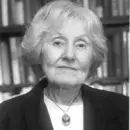
Gertrude Himmelfarb
Professor Gertrude Himmelfarb is a Professor Emerita at City University of New York. Himmelfarb began graduate work in history at the University of Chicago. Himmelfarb wrote her Master's thesis on Robespierre under the direction of well-known historian Louis Gottschalk and received her MA in 1944. Himmelfarb published her first book, an edition of Lord Acton's Essays on Freedom and Power, in 1948. In 1950 she received her Ph.D. from the University of Chicago. During the late 1940s and early 1950s Himmelfarb wrote several articles and began to establish her area of expertise in Victorian intellectual history. In 1952 her book Lord Acton: A Study in Conscience and Politics was published and received high praise from reviewers. Himmelfarb was an individual with strong ideas on a variety of topics. She believed that among mankind's most important ideas are those relating to politics, religion, and moral values. In her youth a classic liberal, she became increasingly appreciative of the conservative point of view. In the following decades she continued her exploration of politics, morality, and history in books and articles on leading intellectuals of the Victorian period, most notably John Stuart Mill, whose works she also edited, and Charles Darwin. The Idea of Poverty: England in the Early Industrial Age (1984) examined the rise of poverty as a social problem and was her first direct attempt to exonerate the early Victorian treatment of the poor. After her retirement from City University of New York in 1988, Himmelfarb continued to write a large number of articles on a variety of topics in both popular and professional periodicals, and her work continued to be informed by her conservative views. For example, she wrote opinion articles in the New York Times against changes in academic curricula, academic affirmative action quotas, and radical feminism. She pursued her interest in the Victorian moral imagination in articles in the Wilson Quarterly and in Commentary.